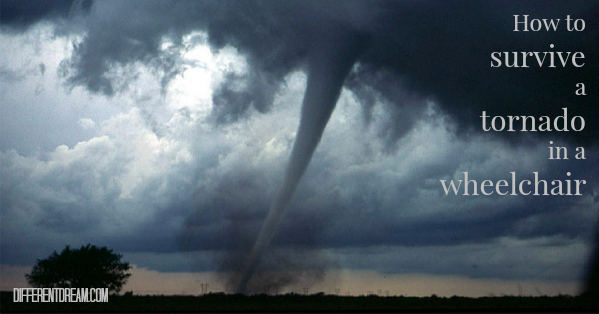9 Tips for Surviving a Tornado in a Wheelchair

Tornado season scared me to death when I was a kid. First, because of the scene in The Wizard of Oz when the tornado bears down on Dorothy as she pounds on the door of the storm cellar to no avail. Young as I was, I realized that though Dorothy might have survived a twister in movie world Kansas, in the real world she would have been toast. Second, because of what occurred whenever the tornado sirens sounded in our town. Mom would call her brother-in-law who lived about 8 blocks away. He would drive over, help Mom get Dad and his wheelchair into the basement, and then go back to his house to wait out the storm with his family. Young as I was, I realized that if a tornado had touched down between our house and his, the grown ups I loved most in the world would also have been toast.
With tornado season in full swing where I live, I wanted to learn how tornado preparedness, especially for people in wheelchairs, has advanced over the years. Research showed that some improvements, though perhaps not enough, have been made. Based on what I learned, here are 9 tips–some old and some new–for surviving a tornado in a wheelchair.
- Create a plan. Before tornado season, decide what to do if a tornado hits. What do you need to have in place before tornado season? Where will you go if a tornado warning sounds? Do you need someone to assist you, and if so, who will that be? Practice the plan with all the members of the family. If some of your family members are children or the person in the wheelchair is a child, make the practice into a game to prevent fears from arising.
- Develop a support network. Enlist the support of family members, friends, and neighbors willing to take the person in a wheelchair to a safe place.
- Register your family. Let the local fire department, emergency management, team and volunteer centers know your family includes someone in a wheelchair.
- Post emergency medical information on the refrigerator. This should include including a list of the equipment the family member in the wheelchair needs, medication dosages, and emergency contact numbers.
- Put together an emergency kit. The kit could consist of batteries (including an extra wheelchair battery), medications, emergency medical information, water, food supplies for special dietary needs, a manual wheelchair for back up, gloves for operating it, and a weather radio.
- Call the power company. This is essential if your family member’s wheelchair is battery-operated or if other equipment depends on power, such as oxygen tanks or a ventilator. Some power companies maintain maps and lists of locations of customers who are power-dependent in case of an emergency, They also offer advice about setting up alternate power sources in case of an emergency.
- Identify or build a safe room. A safe room is the best place for surviving a tornado in a wheelchair because it’s easier to access than a basement. Families building new homes should consider including a safe room. Those in existing homes should consider retrofitting an existing space as a safe room. The next best option is to designate an interior room or closet without windows as a safe space.
- Keep a pillow or mattress handy. A pillow can be placed lightly over a small child in a wheelchair to protect against flying glass or heavy debris. A mattress can serve the same purpose in a safe room or large closet and other family members can crawl under it, too.
- Clear a path. Keep the pathway to the safe room clear of furniture and other obstacles so it can be reached quickly and easily.
Disaster planning guides for people with a wide variety of special needs and disabilities can be accessed through the article Tornadoes and People with Disabilities located at the Disabled World website.
Do you like what you see at DifferentDream.com? You can receive more great content by subscribing to the quarterly Different Dream newsletter and signing up for the daily RSS feed delivered to your email inbox. You can sign up for the first in the pop up box and the second at the bottom of this page.
By Jolene
Jolene Philo is a published author, speaker, wife, and mother of a son with special needs.
Subscribe for Updates from Jolene
Related Posts
The Lessons I Learned while Raising a Child with EA/TEF
Jolene Philo reflects on a lifetime of lessons learned while raising a child with EA/TEF and shares the insights she’s won.
Looking Back at Your Child’s EA/TEF Journey
Looking back at your child’s EA/TEF journey can give parents a new perspective about past events. Guest blogger Maggi Gale shares how her look back clearly showed her how God was with their family during their daughter’s very unusual first weeks of life in 2002. Three...
How Do I Let Go of My Adult EA/TEF Child?
Valeria Conshafter explores the question “How do I let go of my adult EA/TEF child?” for EA/TEF Awareness Month.






0 Comments